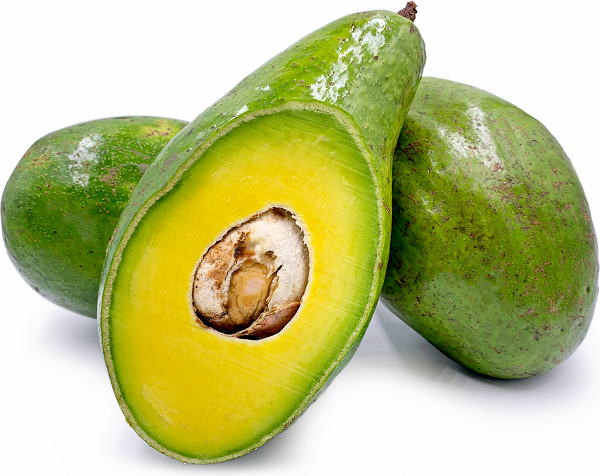
The instability in the price of crude has led many developing, oil-producing countries to initiate policies to promote the flow of foreign exchange from other commodities. Nigeria is blessed with vast several agricultural commodities, some of whose industrial utilisation have not been given adequate national attention or promoted extensively.
Government efforts to boost agricultural production and productivity through enhancing market linkages and access to e-extension technology are mostly directed towards the development of commodities such as cocoa, rice, maize, etc., with little or no emphasis on underutilised plant species such as avocado. Among all fruits, only olive (Oleo europa) and the oil palm fruit (Elaeis guineensis) can rival avocado oil in content.
Avocado, commonly referred to as the ‘African pear’ (dacryodes edulis) is a well-known plant in West Africa. Studies carried out in Nigeria have shown that the development of avocado has the potential of generating about N50 billion annually, in addition to enhancing job creation and establishing new processing industries. Its industrial processing has the capacity to promote the development of food and beverages, as well as pharmaceutical and cosmetic industries in the country.
Studies carried out by the Raw Materials Research and Development Council (RMRDC) indicate that the avocado is mostly found in the forests, farmlands and homesteads in Nigeria. It predominantly grows in the southern and central parts of Nigeria. Its distribution is closely related to vegetation conditions, with the rainforest having the most abundant distribution. The plant grows in situ in Imo, Abia, Anambra, Enugu, Ebonyi, Edo, Akwa-Ibom, Delta and Cross River states. Although [it is] marketed to a reasonable extent, avocado is less abundant in Lagos, Ogun, Ondo, Bayelsa, Taraba and Rivers states when compared with the other native states mentioned earlier. In most of the central parts of the country (Kwara, Kogi, Benue, Niger and Nasarawa states) it occurs occasionally. Also, it is found to a less extent in Plateau and Kaduna.
In a chat with Science Nigeria, a food nutritionist, Tessy Okpala, highlighted that in sub-Saharan Africa, Kenya is a major avocado producer, with an estimated annual production of 180,000 tonnes in 2019. The Kenyan avocado sub-sector is experiencing new investments as it gradually opens up to investors. Annually, more than 1,000 containers are shipped to Europe, the Middle East and Asia. Kenya has about 8,000 hectares of land dedicated to the crop. Some incentives which have contributed to the development of avocado farming in Kenya are increased interest and investment in the sector by the government, contract farming and replacement of old trees with improved varieties.
She posited that the major factors driving the increase are the oil content and nutritional values.
“Avocado contains about 30 per cent oil that has a high digestibility coefficient, excellent keeping quality with high values of palmitic, oleic and stearic acids as constituents of the oil. Depending on cultivars, the lipid content varies from 5 – 25 per cent with a myristic acid level of 0.1 per cent, palmitic acid varies from 7 – 12 per cent and stearic acid ranged from 1 – 1.7 per cent.
“The unsaturated fatty acids include palmitoleic acid which varies from 5.5 to 11 per cent, oleic acids from 52 – 81 per cent and non-saponifiables which varies from 1.6 to 2.4 per cent. The major amino acid contents of the pulp are glutamic acid 12.3 per cent, aspartic acid 22.6 per cent and alanine 6.0 per cent. The oil is of great importance to the cosmetic industry as it contains sterol (called photosterol) which has high penetrating abilities. The oil is easy to emulsify and its low surface tension produces smoothening creams and makes superior cosmetic oil.
“The impressive list of vitamins found in avocado oil is of benefit to the cosmetic industry as vitamin A helps to prevent dry skin and vitamins E (tocopherol) and B are effective against skin wrinkling. It is the fifth in the list of the most desirable oils known as anti-cholesterol agents,” she pointed out.
The expert posited that avocados have been marketed as a healthy dietary choice and as a good source of beneficial monounsaturated oil. A whole medium avocado contains approximately 15 per cent of the FDA’s recommended daily amount of saturated fat. In addition, avocados have 60 per cent more potassium than bananas.
According to her, Avocados are also a benefit to a diabetic diet. With diabetes increasing the country, avocados can offer a nutritious choice for those following a diabetic diet. The nutritional component analysis shows the fruit to consist essentially of 74.9 per cent of water, 19.8 per cent of fat and 11.3 per cent ascorbic acid.
Okpala elucidated that the ripe fruit can be eaten and used in preparing salads, as a flavouring for ice cream, filling for sandwiches and in ‘quick’ desserts. In Brazil, Vietnam and Taiwan, avocados are frequently used for milkshakes and occasionally added to ice cream. In the Philippines, Jamaica and Indonesia, a dessert drink is made with sugar, milk and pureed avocado.
She further stated that in Central America, avocados are served mixed with white rice. In Chile, they are often used in hamburgers, hot dogs and celery salads. A frozen puree known as guacamole salad is a well-known avocado product of commercial relevance. This product can be stored for weeks, frozen at -18oC.
She maintained that the avocado paste has also been prepared on an industrial scale. The typical composition of the fatty acids does not change, even after 40 weeks of storage.
The nutritionist added that the stability in lipid fraction is due to a high content of natural antioxidants and tocopherols. Also, yoghurt is being supplemented with avocado, given its healthy nutritional components. The product had been made from fresh avocado paste, milk, and dairy starter culture. The homogeneity of the product can be improved by the addition of a stabiliser (such as gelatin 0.2 – 0.4 per cent).
“The leaves, seed and bark of avocado trees are employed for treatment of various diseases. These provide opportunities for the extraction of active ingredients from them for drug formulation. When boiled, the leaves are used as a remedy for diarrhoea. The pulp is used to hasten the formation of pus in wounds while the seeds can be smashed and used as a remedy for toothaches.
“However, despite its increasing popularity, the plant’s development faces some issues. Avocado trees are much more expensive to establish than most other fruits. This makes it hard for non-wealthy farmers to invest in large land areas. Before 2012, even in developed economies, only rich farmers were involved in large-scale farming because it was costlier and viewed as an investment.
“Upper-class farmers are aware of uses best practices and own lands along the coast. However, the crop could be an opportunity to help younger entrepreneurs in Nigeria to work in agriculture since it is knowledge-intensive and can open investment opportunities and high returns to youth who had no previous interest in agriculture. In Nigeria, avocado is planted to some extent by some farmers, although, productivity is mostly low,” she added.
In carrying out its intervention in avocado development, the Raw Materials Research and Development Council (RMRDC) has made it one of the strategic projects in its boosting the development of agricultural commodities for industrial use programme.

Speaking exclusively with Science Nigeria, the director-general, RMRDC, Prof. Hussaini Ibrahim, said through this project, the council is collaborating with some agricultural research outfits and private sector operatives to carry out productivity improvement trials on local avocado varieties.
According to him, the council has also concluded arrangements for the development of the internationally recognised HASS variety from Mexico and California in the United States of America for locational and adaptation trials in the country.
He maintained that the council’s field trials of the local varieties have shown that productivity can be greatly improved on under farm conditions in the southern parts of the country, adding that the chemical composition and nutritional components of the fruits of the cultivars produced through the various trials have been conducted.
“The results confirmed what was expected from the literature. The council in collaboration with 3 private sector food processing companies working on product developed for use in the food and beverages, chemical and pharmaceutical and cosmetics sectors of the economy. Likewise, the council has completed arrangements with farmers interested in large-scale farming of avocados in Nigeria.
“More than 8 farmers have indicated interest are working with experts on assessing their farms for plantations to be established. When fully completed, this initiative will save the nation more than N50billion in foreign exchange equivalent, apart from its wealth and job creation potential. The council wishes to invite interested private sector operatives to participate in avocado farming and processing to visit any of its offices in the Federation for further discussions on the partnerships,” he added.


